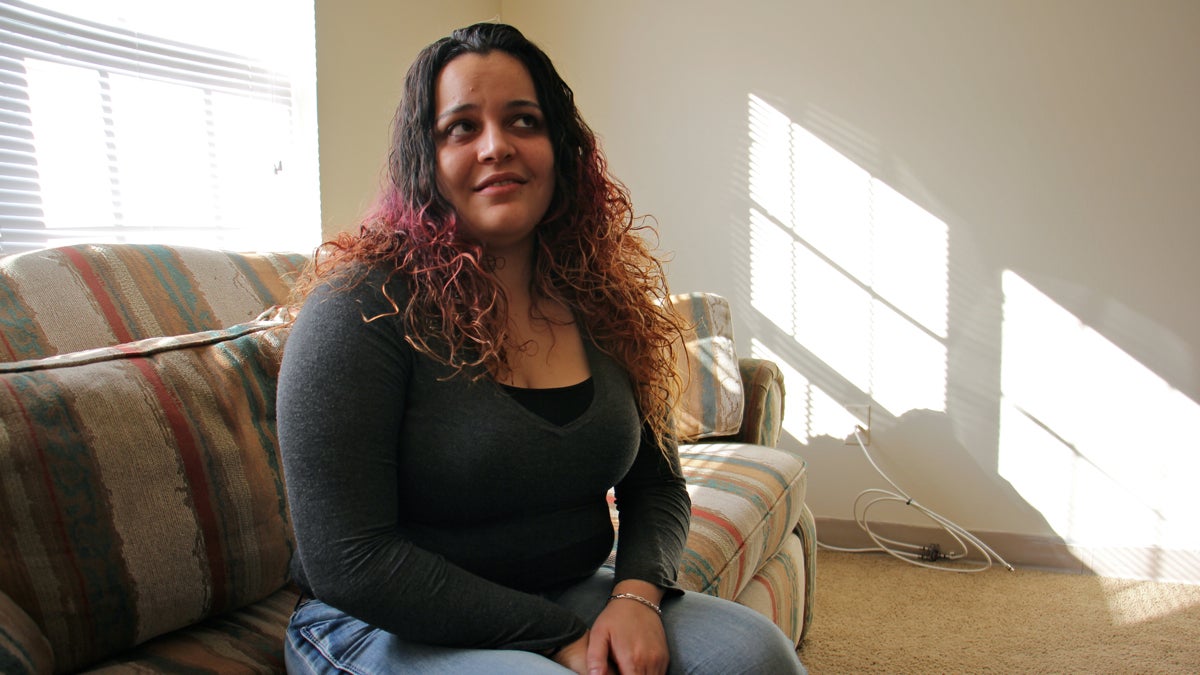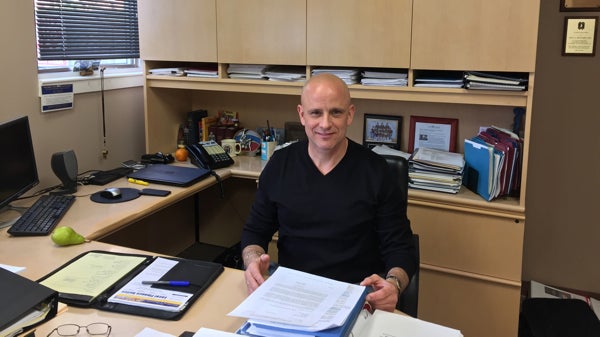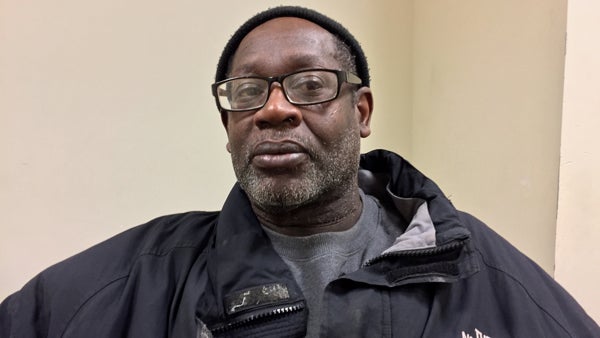N.J. will eliminate cash bail, speed up criminal trials in 2017
Listen
Jeannette Santiago
WHYY is one of 15 news organizations in the Philadelphia Reentry Reporting Collaborative, a solutions-oriented focus on the issues facing formerly incarcerated Philadelphians. The aim is to produce journalism that speaks, across the city and across media platforms, to the challenges and solutions for reentry.
Changes coming to New Jersey courts next year aim to speed up trials and end the use of cash bail
On June 2, 2015, police equipped with a search warrant knocked on the door of Jeannette Santiago’s Camden home.
Santiago said the target of the warrant was a friend who had been selling drugs out of her house, but that officials went after her too because the deed to the house was in her name.
She was charged with eight drug- and gun-related felonies.
In no time, Santiago was shipped to the county jail, where she would spend the next 17 months, unable to afford the bail for her release.
First bail was set at $700,000, cash or bond. Two weeks later, it dropped to $500,000. Ultimately it was reduced to $175,000, with the option of paying 10 percent.
“I just cried. I was like, ‘I’m not going anywhere,'” said Santiago. “There’s no way my family could do anything about that.”
In late October, she finally made bail. A bond agency took $8,000, and Santiago said she is still paying off the balance.
She pleaded guilty to one count of conspiracy to possess a controlled substance, her first felony.
But even sitting on her couch in her new apartment in Voorhees, ready to start a new chapter in her life, the mother of two lamented the time she spent cooped up in jail in downtown Camden.
“I missed 17 months of my children’s lives. You know, birthdays and holidays and everything. You miss a lot. You come home, and everything is different,” she said. “Everything is different.”
Changes coming to New Jersey courts next year aim to speed up trials and get rid of monetary bail, with the hope of eliminating any more cases like Santiago’s.
How it will work
New Jersey had a jail problem in 2013. Too many people were incarcerated because they could not afford to pay the bail required for their release.
An analysis by the nonprofit Drug Policy Alliance and the consulting firm Luminosity found that 38.5 percent of all inmates in New Jersey jails were there only because they couldn’t pay their own bail.
That year, voters approved a New Jersey constitutional amendment allowing courts to detain defendants in criminal cases without bail; previously, defendants had to be granted bail by law (excluding those accused of capital crimes).
Several state laws followed, setting timelines for a speedy trial and eliminating money bail in all but a few cases.
Instead of setting bail, judges will now determine whether a defendant should be released before trial based on whether they are likely to commit another crime or skip their court date.
And they will make that determination, in part, using a computer program.
Here’s how the new system will work:
Anyone arrested for a crime is entitled to a pretrial detention hearing within 48 hours of their arrest.
Court officials will enter specific information about a defendant — age, prior convictions, and previous instances when the defendant missed a court date — into the computer, which will spit out a number.
At the detention hearing, the judge will use that number as well as any additional arguments made by the prosecutor or defense attorney to determine whether to hold or release the defendant.
Judges will have three options: Release the defendant on their own recognizance; release the defendant with some non-monetary conditions, such as a curfew or GPS monitoring; or detain the defendant until trial.
Advocates say the new method will eliminate two problematic scenarios that occur when money bail is used: nonviolent, poor people stuck in jail because they cannot afford bail and dangerous people of some means who can pay their way out.
 John Donnadio, executive director of the New Jersey Association of Counties, supports the criminal justice reforms in theory but says they will cost counties too much. (Joe Hernandez/WHYY)
John Donnadio, executive director of the New Jersey Association of Counties, supports the criminal justice reforms in theory but says they will cost counties too much. (Joe Hernandez/WHYY)
“We’ve had a system so far that’s based only on wealth,” said Alexander Shalom, a senior staff attorney with ACLU-NJ. “[But] we want to keep dangerous people in and let non-dangerous people out, rather than keep poor people in and let rich people out.”
If a judge decides to detain a defendant, that activates the second part of the criminal justice changes coming to New Jersey courts in 2017: the speedy trial component.
Although the Sixth Amendment to the U.S. Constitution guarantees criminal defendants a “speedy trial,” New Jersey lawmakers decided to ensure it by setting legal timelines within which a case must be heard.
Grand juries must return indictments within 90 days of a defendant’s detention, and a trial has to begin at most 180 days after the indictment.
Cities such as Chicago have adopted pretrial risk assessment algorithms to replace money bail, but criminal justice experts said that New Jersey was the first to implement such comprehensive statewide reforms.
“It’s really a sort of full overhaul,” said Insha Rahman, senior planner at the Vera Institute, a nonprofit that studies criminal justice and incarceration nationally. “Other places such as Kentucky and Colorado have taken bits and pieces of the reforms.”
Rahman added that New Jersey’s bail and trial reforms are noteworthy because almost all of the relevant stakeholders — judges, prosecutors, defense attorneys, politicians, civil liberties activists — are on board.
Almost all of them.
‘It does cost money to provide justice’
John Donnadio did not want to be the guy who threw cold water on criminal justice reforms in New Jersey.
“They shouldn’t languish in jail. They should be out and, hopefully, being productive members of the community and being back with their families. I 100 percent agree,” he said.
But he emphasized that supporters of these judicial system upgrades are ignoring the price tag. “This is also going to cost some money.”
Donnadio is the executive director of the New Jersey Association of Counties, which represents the state’s 21 freeholder boards.
Amid widespread support for the bail and speedy trial changes in New Jersey, Donnadio publicly opposed the measures, which he said foisted a brand-new financial burden on counties without appropriating any state money to alleviate the costs.
He said he believed there would be savings through the reforms but that those savings would not make up for the costs to implement the new bail and trial requirements.
The association estimates it will cost each county an average of $1 million to $2 million to implement the reforms.
“We’re going to have to hire new sheriff’s officers, new correction officers, new assistant prosecutors, new investigators, make capital improvements to our court facilities and some of our jails, purchase new security equipment,” he said.
An analysis this year by the state attorney general’s office determined that it was impossible to predict how much the criminal justice reforms would cost.
State lawmakers are considering a bill to add 20 new judges to the court system and appropriate $9.3 million to pay for them.
Nonetheless, it means, according to Donnadio, that counties may have to cut other programs to avoid raising taxes.
“Meals on Wheels and the transportation services for the aged and disabled are not state-mandated services that we have to provide, like taking care of the court facilities and the county jails,” he said.
Besides asking for state appropriations, the association also suggested some cost-saving measures, such as a hiring freeze on prosecutors and video conferencing on weekends so that courts do not have to physically open their doors.
Shalom, with the ACLU-NJ, said officials worried about the costs of these criminal justice reforms should prosecute fewer low-level criminals.
 New Brunswick resident Samuel Jones sat in jail for months because he could not afford his $1,500 bail. (Joe Hernandez/WHYY)
New Brunswick resident Samuel Jones sat in jail for months because he could not afford his $1,500 bail. (Joe Hernandez/WHYY)
“It does cost money to provide justice,” said Shalom. “They can stop aggressively prosecuting these things. But until they do, criminal defendants are entitled to constitutional protections.”
A complaint filed by the association is still pending before the state Council on Local Mandates, a body independent of all three branches of state government that can invalidate any law it deems poses an “unfunded mandate” on counties or towns.
The council is aiming to schedule a hearing on the matter late next week, just days before the reforms are set to take place.
Until then, people will continue to have the experience Samuel Jones had late last year.
The New Brunswick resident was arrested on several drug charges in late 2015 and faced a $35,000 bail.
Even once it was reduced to $15,000 with the option to post just 10 percent, Jones, who spent more than two months in jail, could not afford to pay.
“That’s a lot of money. That’s something I don’t have,” Jones remembers thinking at the time. “I’m going to be in here for a while.”
NOTE: An earlier version of this story failed to mention Santiago’s guilty plea. That has been added. The plea was mentioned in the broadcast version.
WHYY is your source for fact-based, in-depth journalism and information. As a nonprofit organization, we rely on financial support from readers like you. Please give today.




